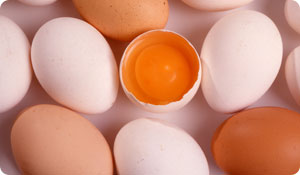
Whole or separated, in recipes or on their own, eggs are an important part of most people's diets. But if you're concerned about heart disease, shouldn't you worry about the fat and cholesterol in eggs? Not if you know which parts of the egg to use, and when to use them.
Whole Eggs
One large egg contains 72 calories, 5 g of fat, 2 g of saturated fat, and 213 mg of cholesterol. Most of the calories and fat and all of the saturated fat and the cholesterol are in the yolk and, as a result, if you are concerned about high blood cholesterol and heart disease, your health care provider may tell you to limit the number of eggs, and egg yolks in particular, that you eat each week. Considering how many foods contain eggs, however, that advice can be difficult to follow. If you limit the amount of cholesterol from other sources, such as meats, poultry, and dairy products, you don't have to worry so much about using eggs. Overall, the U.S. Department of Agriculture says that eating one whole egg a day will not increase your risk of developing heart disease.
Whites Only
Egg whites are practically pure protein, and high-quality protein to boot. Plus, two large egg whites contain only 35 calories, less than 1 gram of fat, and no saturated fat or cholesterol. While it is possible to replace each whole egg with two egg whites in just about any recipe, including baked goods, the end result may be drier or less tender. The fat in an egg yolk contributes to the moistness and tenderness of baked goods such as cakes and muffins, so if you leave them out, be sure the recipe contains enough healthful fat, such as olive oil or a tenderizing ingredient such as yogurt. If not, you may want to add back at least one yolk.
Whole Eggs With Extra Whites
If you're looking to boost the protein in your diet without eating more meat or dairy products, egg whites can help. For instance, when you are making an omelet or a scrambled egg dish, you can add several egg whites to the whole eggs you normally use.
If you are cutting back on cholesterol and fat in your diet, combine whole eggs with egg whites. For instance, instead of replacing two whole eggs with four whites, use one whole egg and two whites.
Egg Substitutes
Commercial egg substitutes are made with eggs whites and small amounts of additives such as coloring, flavoring, and ingredients such as gums, that improve texture and consistency. The nutritional profile of an egg substitute is similar to that of two egg whites: one-quarter cup contains 30 calories and no fat, saturated fat or cholesterol. In addition, vitamins and minerals may be added to make up for those that are normally found in the yolk. You can use egg substitutes to replace all the whole eggs in your cooking, or you can use a combination of whole eggs and egg substitute in the same ways you would combine whole eggs and egg whites.
If you keep eggs in the house because you sometimes cook with whole eggs, however, you may as well just use fresh egg whites when you need a substitute for whole eggs. Overall, you will save money than if you buy both whole eggs and containers of egg substitute. But if you follow a completely yolk-free diet in your household, then commercially prepared egg substitutes are probably your best bet so you won't have to worry about what to do with all those yolks.
Sources:
Behrenbeck, T. "Are Chicken Eggs Good or Bad for My Cholesterol?" Mayo Clinic. Web. 24 Jun 2011
http://www.mayoclinic.com/health/cholesterol/HQ00608
U.S. Department of Agriculture; Nutrition Evidence Library: What is the Effect of Dietary Cholesterol Intake on Risk of Cardiovascular Disease? We. 24 Jun 2011
http://www.nel.gov/evidence.cfm?evidence_summary_id=250206





